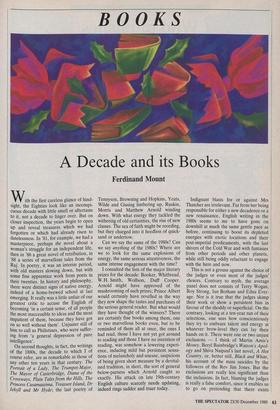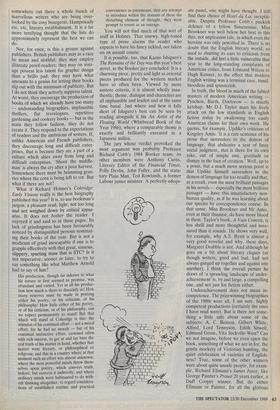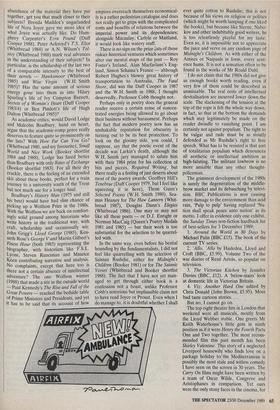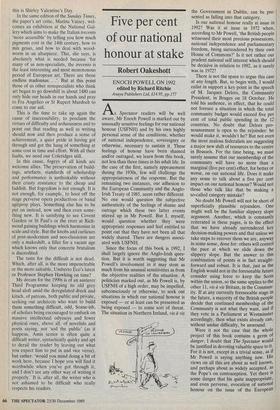BOOKS
A Decade and its Books
Ferdinand Mount
With the first careless glance of hind- sight, the Eighties look like an inconspi- cuous decade with little smell or aftertaste to it, not a decade to linger over. But on closer inspection, the years begin to open up and reveal treasures which we had forgotten or which had already risen to datelessness. In '81, for example, we had a masterpiece, perhaps the novel about a woman's struggle for an independent life, then in '86 a great novel of retribution, in '88 a series of marvellous tales from the Raj. In poetry, it was an interim period, with old masters slowing down, but with some fine apprentice work from poets in their twenties. In history and philosophy, there were distinct signs of native energy, indeed of a home-brewed school at last emerging. It really was a little unfair of our greatest critic to accuse the English of becoming 'in a certain sense, of all people the most inaccessible to ideas and the most impatient of them, because .they have got on so well without them'. Unjuster still of him to call us Philistines, who were suffer- ing from 'a general depression of pure intelligence'. On second thoughts, in fact, the writings of the 1880s, the decade to which I of course refer, are as remarkable as those of any other ten years in that century: The Portrait of a Lady, The Trumpet-Major, The Mayor of Casterbridge, Diana of the Crossways, Plain Tales from the Hills, The Princess Casamassima, Treasure Island, Dr Jekyll and Mr Hyde; the last poetry of
Tennyson, Browning and Hopkins, Yeats, Wilde and Gissing limbering up, Ruskin, Morris and Matthew Arnold winding down. With what energy they tackled the withering of old certainties, the rise of new classes. The sea of faith might be receding, but they charged into it heedless of quick- sand or undertow.
Can we say the same of the 1980s? Can we say anything of the 1980s? Where are we to look for the same explosions of energy, the same serious attentiveness, the same intense engagement with the time?
I consulted the lists of the major literary prizes for the decade: Booker, Whitbread, W.H. Smith, Wolfson, Duff Cooper. Arnold might have approved of the mushrooming of such prizes; Prince Albert would certainly have revelled in the way they now shape the tastes and purchases of the serious general reader. But what would they have thought of the winners? There are certainly fine books among them, one or two marvellous books even, but to be reminded of them all at once, the ones I had read, those I have not yet got around to reading and those I have no intention of reading, was somehow a lowering experi- ence, inducing mild but persistent sensa- tions of melancholy and unease, suspicions of being given short measure by a devital- ised tradition, in short, the sort of general below-parness which Arnold caught so exactly. His attack on late 19th-century English culture scarcely needs updating, indeed rings sadder and truer today.
Indignant blasts for or against Mrs Thatcher are irrelevant. Far from her being responsible for either a new decadence or a new renaissance, English writing in the 1980s seems to me to have gone on downhill at much the same gentle pace as before, continuing to boost its depleted energies with exotic locations and their post-imperial predicaments, with the last shivers of the Cold War and with fantasies from other periods and other planets, while still being oddly reluctant to engage with the here and now.
This is not a grouse against the choice of the judges or even most of the judges' choices. Contrary to myth, the average panel does not consists of Terry Wogan, Roy Strong, Ian Botham and Edna Ever- age. Nor is it true that the judges skimp their work or show a persistent bias in favour of the shoddy or superficial. On the contrary, looking at a ten-year run of their selections, one sees how conscientiously they try to embrace talent and energy at whatever brow-level they can lay their hands on it. There were one or two unjust exclusions — I think of Martin Amis's Money, Beryl Bainbridge's Watson's Apol- ogy and Shiva Naipaul's last novel, A Hot Country, or, better still, Black and White, his account of the mass suicides by the followers of the Rev Jim Jones. But the exclusions are really less significant than the inclusions. In fact, blaming the judges is really a false comfort, since it enables us to go on pretending that there exists
somewhere out there a whole bunch of marvellous writers who are being over- looked by the cosy bourgeois, Hampsteady etc, etc, literary establishment. It is a far more terrifying thought that the lists do approximately represent the best we can do.
Nor, for once, is this a grouse against publishers. British publishers may as a race be mean and slothful; they may employ illiterate proof-readers; they may on aver- age possess less talent for graphic design than a brillo pad; they may have what amounts to a genius for letting their books slip out with the minimum of publicity. But I do not think they actively suppress talent. At worst, they encourage the production of books of which we already have too many — undemanding biographies, implausible thrillers, flat travelogues, repetitive gardening and cookery books — but in the main they follow fashion, they do not create it. They respond to the expectations of readers and the ambitions of writers. If, unlike American and French publishers, they discourage long and difficult enter- prises, that is because they are a part of a culture which shies away from long and difficult enterprises. 'Shoot the middle- man' is always the cry after a poor harvest. Somewhere there must be brimming gran- ries where the corn is being left to rot. But what if there are not?
What if Richard Holmes's Coleridge: Early Visions really is the best biography published this year? It is, to use bookman's jargon, a pleasant read, light, not too long and not weighed down by critical appar- atus. It does not bother the reader. I enjoyed it and said so in these pages. Its lack of grindingness has been favourably noticed by distinguished persons nominat- ing their books of the year. But is not a modicum of grind inescapable if one is to grapple effectively with that great, sinuous, slippery, spurting mass that is STC? Is it not imperative, sooner or later, to try to say something like what Matthew Arnold had to say of him?
His production, though far inferior to what his nature at first seemed to promise, was abundant and varied. Yet in all his produc- tion how much is there to dissatisfy us! How many reserves must be made in praising either his poetry, or his criticism, or his philosophy! How little either of his poetry, or of his criticism, or of his philosophy, can we expect permanently to stand! But that which will stand of Coleridge is this: the stimulus of his continual effort — not a moral effort, for he had no morals — but of his continual instinctive effort, crowned often with rich success, to get at and lay bare the real truth of his matter in hand, whether that matter were literary, or philosophical or religious; and this in a country where at that moment such an effort was almost unknown; where the most powerful minds threw them- selves upon poetry, which conveys truth, indeed, but conveys it indirectly; and where ordinary minds were habituated to do with- out thinking altogether, to regard considera- tions of established routine and practical convenience as paramount, that any attempt to introduce within the domain of these the disturbing element of thought, they were prompt to resent as an outrage.
You will not find much of that sort of stuff in Holmes. That sinewy, high-toned type of prose alarms the reader who expects to have his fancy tickled, not taken on an assault course.
It is possible, too, that Kazuo Ishiguro's The Remains of the Day was this year's best novel, as the Booker jury concluded. It is a charming piece, pretty and light as oriental pieces produced for the western market have so often been. Viewed by more austere criteria, it is almost wholly inau- thentic; theme, dialogue and characters are all implausible and leaden and at the same time banal. Just where and how it falls short of Ishiguro's best can be seen by reading alongside it his An Artist of the Floating World (Whitbread Book of the Year 1986), where a comparable theme is exactly and brilliantly executed in a Japanese milieu.
The jury whose verdict provoked the most argument was probably Professor Richard Cobb's 1984 Booker team; its other members were Anthony Curtis, Literary Editor of the Financial Times, Polly Devlin, John Fuller, and the statu- tory Plain Man, Ted Rowlands, a former Labour junior minister. A perfectly adequ- ate panel, one might have thought. I still find their choice of Hotel du Lac inexplic-
able. Despite Professor Cobb's puckish defence of a fellow Simenoniac, Miss Brookner was well below her best in this thin, not unpleasant tale, in which even the heroine was only pencilled in. There is no doubt that the English literary world, so used to shutting its ears to criticism from the outside, did feel a little vulnerable that year to the long-standing complaints of American critics, from Edmund Wilson to Hugh Kenner, to the effect that modern English writing was a terminal case, timid, bloodless and spinsterish.
In truth, the blood in much of the fabled masters of modern American writing — Pynchon , Barth, Doctorow — is strictly ketchup. Mr D.J. Taylor mars his lively attack on the low standards in English fiction today by swallowing too easily American claims for their own work. He quotes, for example, Updike's criticism of
Kingsley Amis: 'It is a rare sentence of his prose that surrenders to the demon of language, that abdicates a seat of fussy social judgment, that is there for its own sake, out of simple awe, gratitude or dismay in the face of creation.' Well, up to a point, but a much more serious point is that Updike himself surrenders to the demon of language far too readily and that, as a result, even the most brilliant passages in his novels — especially the most brilliant passages — have this unsatisfactory non- human quality, as if he was learning about our species by correspondence course. In that sense, Miss Brookner and Mr Amis, even at their thinnest, do have more blood in them. Taylor's book, A Vain Conceit, is less shrill and more thoughtful and mea- sured than it sounds. He shows very well, for example, why A.S. Byatt is almost a very good novelist and why, these days, Margaret Drabble is not. And although he goes on a bit about literary cliques (as though writers, good and bad, had not always ganged up together and against one another), I think the overall picture he draws of 'a sprawling landscape of under- achievement' is, by and large, a compelling one, and not just for fiction either.
Underachievement does not mean in- competence. The prizewinning biographies of the 1980s were all, I am sure, highly competent productions (certainly the ones I have read were). But is there not some- thing a little safe about some of the subjects: A. C. Benson, Gilbert White, Alfred, Lord Tennyson, Edith Sitwell, Edmund. Crosse, Vita Sackville-West? Can we not imagine, before we even open the book, something of what we are in for, the gentle mockery of Victorian humbug, the quiet celebration of varieties of English- ness? True, some of the other winners were about quite unsafe people, for exam- ple, Richard Ellmann's James Joyce, like George Painter's Proust 20 years earlier, a Duff Cooper winner. But do either Ellmann or Painter, for all the glorious abundance of the material they have put together, get you that much closer to their subjects? Brenda Maddox's ungarlanded life of Nora Joyce gave me more idea of what Joyce was actually like. Do Hum- phrey Carpenter's Ezra Pound (Duff Cooper 1988), Peter Ackroyd's T.S. Eliot (Whitbread 1984) or A.N. Wilson's Tol- stoy (Whitbread 1988) mark real advances in the understanding of their subjects? In particular, is the scholarship of the last two of a comparable intensity to the best of their novels — Hawksmoor (Whitbread 1985) and Wise Virgin (W.H. Smith 1985)? Has the same amount of serious energy gone into them as into Hilary Spurling's life of Ivy Compton Burnett, Secrets of a Woman's Heart (Duff Cooper 1983/4) or Ben Pimlott's life of Hugh Dalton (Whitbread 1985)? As academic critics, would David Lodge and Malcolm Bradbury, hand on heart, argue that the academic-romp genre really deserves to feature quite so prominently on the lists? With How Far Can You Go? (Whitbread 1980, and my favourite), Small World and Nice Work (Booker shortlist 1984 and 1988), Lodge has fared better than Bradbury with only Rates of Exchange (Booker shortlist 1983). For all their dry crackle, there is the feeling of an extended skit about these books, perfect for a train journey to a university south of the Trent but not much use for a longer haul. Bradbury's History Man (1975 and still his best) would have had slim chance of picking up a Wolfson Prize in the 1980s. With the Wolfson we are back on comfort- ingly solid ground among historians who write history in the traditional way, with craft, scholarship and occasionally wit: John Grigg's Lloyd George (1985), Ken- neth Rose's George V and Martin Gilbert's Finest Hour (both 1983) representing the biographer, with historians like F.S.L. Lyons, Steven Runciman and Maurice Keen contributing narrative and analysis. No complaints, except that here too is there not a certain absence of intellectual adventure? The one Wolfson winner (1988) that made a stir in the outside world — Paul Kennedy's The Rise and Fall of the Great Powers — reached the bedside table of Prime Ministers and Presidents, and yet it has to be said that its account of how
empires overreach themselves economical- ly is a rather pedestrian catalogue and does not really get to grips with the complicated costs and benefits of relations between the imperial power and its dependencies; alongside Macaulay, Carlyle or Maitland, it would look like watery stuff.
There is no sign on the prize iists of those riskier historical ventures which sometimes alter our mental maps of the past — Roy Foster's Ireland, Alan Macfarlane's Eng- land, Simon Schama's France — although Robert Hughes's blowsy great history of transportation to Australia, The Fatal Shore, did win the Duff Cooper in 1987 and the W.H. Smith in 1988, I thought deservedly, Professor Cobb thought not.
Perhaps only in poetry does the general reader receive a certain sense of concen- trated energies being allowed to go about their business without harassment, Perhaps the fact that modern poetry now has an unshakable reputation for obscurity is turning out to be its best protection. To look on the gloomy side, you could, I suppose, say that the poetic event of the decade was Larkin's death, although the W.H. Smith jury managed to salute him with their 1984 prize for his collection of bits and pieces, Required Writing, but there really is a feeling of just deserts about most of the poetry awards: Geoffrey Hill's Tenebrae (Duff Cooper 1979, but I feel like squeezing it in here), Thorn Gunn's Selected Poems (W.H. Smith 1980), Sea- mus Heaney for The Haw Lantern (Whit- bread 1987), Douglas Dunn's Elegies (Whitbread 1986). One may or may not like all these poets — or D.J. Enright or Norman MacCaig (Queen's Poetry Medals 1981 and 1985) — but their work is too substantial for the selection to be quarrel- led with.
In the same way, even before his bestial hounding by the fundamentalists, I did not feel like quarrelling with the selection of Salman Rushdie, either for Midnight's Children (Booker 1981) or for The Satanic Verses (Whitbread and Booker shortlist 1988). The fact that I have not yet man- aged to get through either book is a confession not a boast, unlike Professor Cobb's notorious but implausible claim not to have read Joyce or Proust. Even when I do manage to, it is doubtful whether I shall ever quite cotton to Rushdie; this is not because of his views on religion or politics (which might be worth lumping if one liked the books), but because like Sterne, Nabo- kov and other indubitably good writers, he is too relentlessly playful for my taste. Even so, it is impossible not to appreciate the juice and verve on any random page of Midnight's Children. As with either of the Amises or Naipauls in form, every sent- ence hums. It is not a sensation often to be found in the works of Mr Roald Dahl.
I do not claim that the 1980s did not give us enough books worth reading, even if very few of them could be described as unmissable. The real costs of intellectual devitalisation are incurred lower down the scale. The slackening of the tension at the top of the rope is felt the whole way down, in fact, so that at the bottom the demands which may legitimately be made on the reader dwindle to vanishing point. I am certainly not against populism. The right to be vulgar and rude must be as stoutly defended as Mr Rushdie's right to free speech. What has to be resisted is that sort of totalitarian populism which denounces all aesthetic or intellectual ambition as high-faluting. The militant lowbrow is no more amiable than any other thought- policeman.
The grimmest development of the 1980s is surely the degeneration of the middle- brow market and its debauching by televi- sion. BBC Publications is now causing more damage to the environment than acid rain, 'Pulp to pulp' having replaced 'Na- tion shall speak peace unto nation' as its motto. I offer in evidence only one exhibit, the Sunday Times non-fiction hardback list of best-sellers for 3 December 1989: 1. Around the World in 80 Days by Michael Palin (BBC £15). The book of the current TV series.
2. 'Allo, 'Allo by Hasleden, Lloyd and Croft (BBC, £5.99). Volume Two of the war diaries of Rene Artois, so popular on television.
3. The Victorian Kitchen by Jennifer Davies (BBC, £12). A 'below-stairs' look at domestic life in Victorian Britain.
4. Viz: Another Hard One edited by Chris Donald (John Brown, £5.95). More bad taste cartoon stories.. .
But no, I cannot go on.
The top eight theatre hits in London that weekend were all musicals, mostly from the Lloyd Webber stable. One greets Mr Keith Waterhouse's little gem in ninth position as if it were Henry the Fourth Parts One and Two together. The most recom- mended film this past month has been Shirley Valentine. This story of a neglected Liverpool housewik who finds love on a package holiday to/the Mediterranean is possibly the most stale and witless comedy I have seen on the screen in 30 years. The Carry On films might have been written by a team of Oscar Wilde, Congreve and Aristophanes in comparison. Yet ours were the only stony faces in the cinema, for
1 this is Shirley Valentine's Day.
In the same edition of the Sunday Times, the paper's art critic, Marina Vaizey, wel- comes an exhibition at the National Gal- lery which aims to make the Italian trecento `more accessible' by telling you how much pigments cost in the 14th century, how to mix gesso, and how to deal with wood- worm in an altarpiece. This, she says, is absolutely what is needed because 'for many of us non-specialists, the trecento is the least interesting and most monotonous period of European art. There are those endless madonnas. . .'. But at this point those of us other nonspecialists who think art began to go downhill in about 1480 can only hide our heads in our hands and pray to Fra Angelico or St Rupert Murdoch to come to our aid.
This is the time to take up again the cause of inaccessibility; to proclaim the virtues of difficulty and arduousness and to point out that reading as well as writing should now and then produce a sense of achievement, a quiet pride in having got through and got the hang of something at some cost in time and effort. With all their faults, we need our Coleridges still.
In this cause, fogeys of all kinds are welcome allies. The preservation of build- ings, artefacts, standards of scholarship and performance is unthinkable without their crusty resistance to the cheap and faddish. But fogeydom is not enough. It is not enough, for example, to hoot off the stage perverse opera productions or banal agitprop plays. Something else has to be put on instead, now and then even some- thing new. It is satisfying to see Covent Garden or St Paul's or the river at Rich- mond gaining buildings which harmonise in scale and style. But the knobs and curlicues of post-modernism and neo-classicism are only a makeshift, a filler for a vacant age which knows only that concrete brutalism is discredited.
The taste for the difficult is not dead. Which, after all, is the more impenetrable or the more saleable, Umberto Eco's latest or Professor Stephen Hawking on time?
My dream for the 1990s is of an austerer Third Programme keeping its old grey head aloft amid the deregulated dreck and kitsch, of patrons, both public and private, seeking out architects who want to build them something difficult, odd, Soane-ish, of scholars being encouraged to embark on massive intellectual odysseys and fewer physical ones, above all, of novelists and poets saying, not 'sod the public' (as it happens, Amis senior is often quite a difficult writer, syntactically quirky and apt to derail the reader by leaving out what you expect him to put in and vice versa), but rather: 'would you mind doing a bit of work here, because I hope you will find it worthwhile when you've got through it, and I don't see any other way of writing it properly.' It is, after all, the writer who is not ashamed to be difficult who really respects his readers.













































































































 Previous page
Previous page